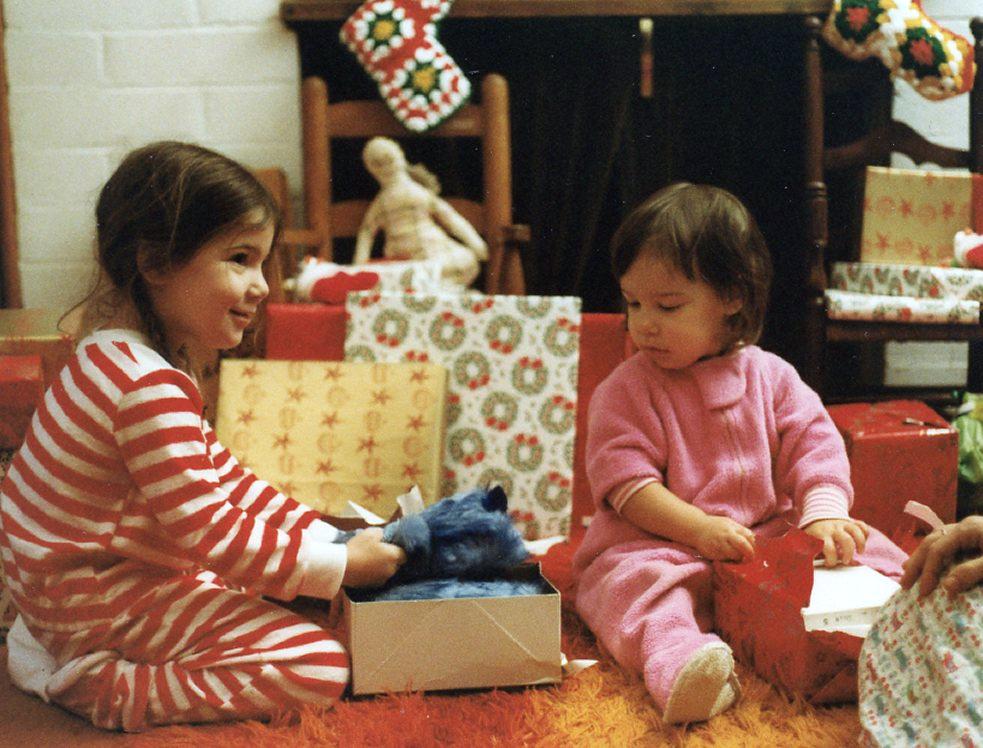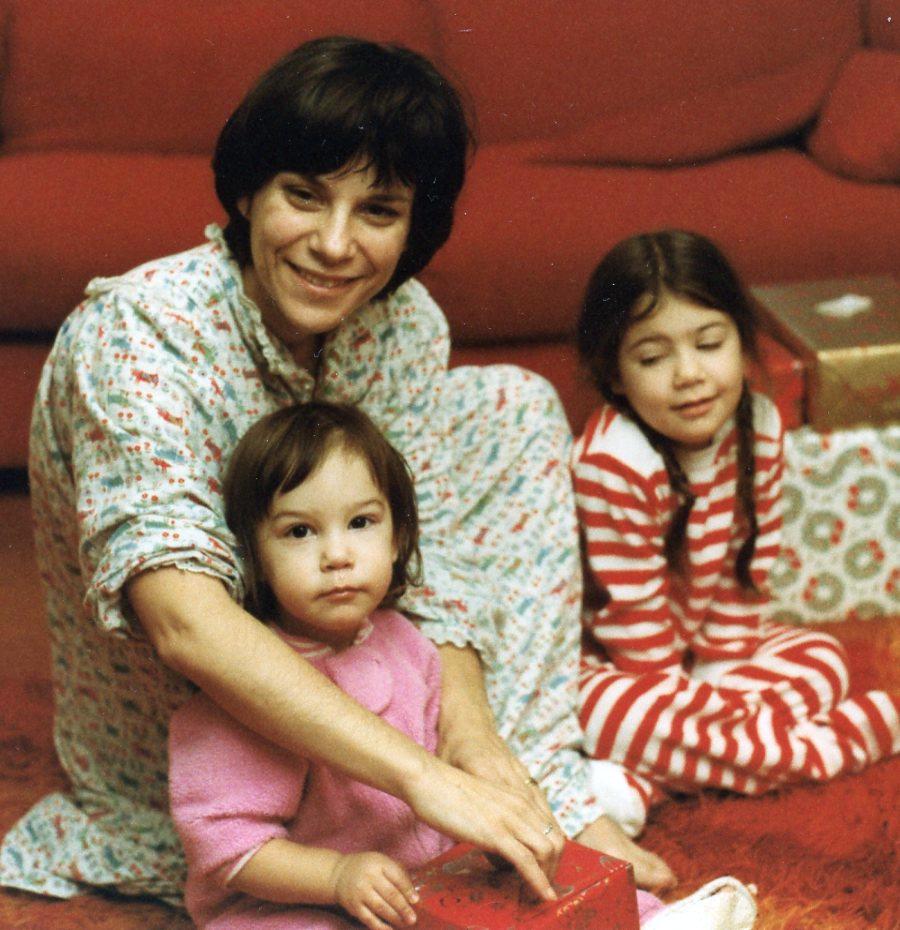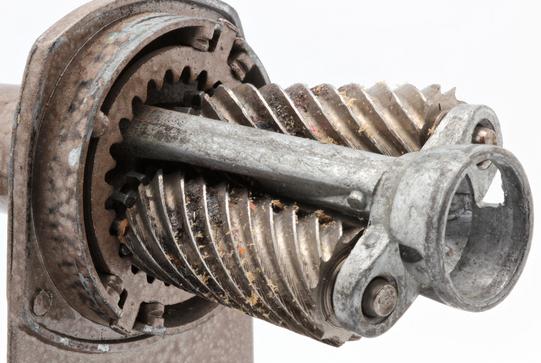 Why am I writing about Christmas? We're Jewish. Yet we do celebrate Christmas. True, it's a purely secular Christmas. It's the Christmas of Frosty the Snowman, Rudolph the Red Nosed Reindeer, and rampant materialism. As Tom Lehrer sang, "Angels we have heard on high, tell us to go out and buy!" Here's a picture of Elissa and Sara opening presents in 1979. Note the two crocheted Note 1 stockings hanging on the fireplace behind them - Margie made them herself. They have since unraveled, and have been replaced by larger versions. These are for numerous small "stocking stuffer" presents.  To be a bit less cynical than Tom Lehrer, Christmas is a season of giving and good will towards men (and women). It's a joyous, festive celebration of family. And in the United States, it's hard to avoid. It's all over all the media, with Christmas carols on the radio, and Christmas specials on TV. Families from non-Christian religious traditions have a hard time explaining to their children why they're not celebrating Christmas. The celebration of Christmas goes back a generation in my family, and goes back even earlier than that in Margie's family. Margie's mother Eleanore came from a line of German Jews. When they emigrated to the United States, German Jews often tried as best they could to become integrated into American society. They seem to have been more likely to do so than Jews from Eastern Europe, who sometimes kept to themselves in isolated enclaves. Eleanore's father Otto was from Frankfort, and it appears that he had been already quite assimilated into the mainstream in Germany. Bernhardt T. Berman, on the other hand, was descended from Russian parents. When he married Eleanore, he was initially against the idea of any celebration of Christmas, which she had celebrated in her own family. But she prevailed upon him to try the custom for a year, and it won him over. Thus was Christmas celebrated in Margie's family when she was a child. This presented some difficulties, as the family lived diagonally across an intersection from her temple's Rabbi. To prevent him from seeing the Christmas tree in their living room, they had to keep their curtains closed during the Christmas season. The tree posed another problem when Bernie's orthodox Jewish parents visited, which they did each December. Their visit sometimes coincided with the Jewish festival of Hanukkah, which I'll talk about a bit later. If it occurred after Christmas, the tree could just be taken down. But if the visit came earlier, the tree was actually hidden in the basement, and then restored after they had left. Gifts in the Berman family were often lovingly hand made. For example, Bernie once made a doll house, and furniture for it. When Margie received a particular doll, Bernie constructed a bed for it, and Eleanore stitched doll clothing. The celebration of Christmas was a bit more spotty in my family, as my parents, from Polish and Russian families, hadn't celebrated that holiday when they were young. But one of my first recollections of the season was coming into the living room of our family apartment in Brooklyn, New York to find what appeared to me to be a floor-to-ceiling stack of presents.
Despite my fond memories of the holiday, I was rather ambivalent about celebrating it myself as an adult. But due to her own happy childhood memories, Margie urged the holiday on me, and I adopted it as well, just as Bernie had been convinced by Margie's mother Eleanore. We generally had a Christmas tree in our living room, just as Margie had had in her youth. I once got the impression this might have somewhat irked some of our neighbors, who seemed to be annoyed a bit that we were celebrating Christmas even though we were non-Christian. We decorated our tree with ornaments that largely came to us from Margie's youth. Margie also enjoyed being able to put tinsel on the tree, which she was seldom allowed to do when she was a child. This was because her father Bernie, a bit obsessive-compulsive, thought she didn't distribute the tinsel evenly enough, but rather put it on in bunches. Note 2 We have always gotten together as a family on Christmas morning to exchange gifts. But circumstances change, and this year Elissa and her husband Ryan, and our granddaughter Darwin, will be spending Christmas with Ryan's family in Pennsylvania. We'll have to have our gift exchange before they leave, rather than on Christmas Day itself. It's a bit sad to have to alter such a long-standing tradition. We also generally ate out at a Chinese restaurant on Christmas eve. I always thought of this as a rather peripheral part of our custom. But Sara is of the opinion that the Christmas eve dinner at a Chinese restaurant, very specifically a Chinese restaurant, is an important part of the tradition, so we intend to maintain that dinner as well, even if we have to move it to a different day.  I probably ought to say something about Hanukkah, a Jewish festival which generally occurs around the time of Christmas. Since it gives Jewish families a holiday of their own to celebrate instead of Christmas, it's become rather elevated in importance. When I worked for Kronos, Incorporated, the president of our largest distributor, in New York, was an Orthodox Jew. He was also one of the inventors of our product, an early investor in the company, and was on the board of directors. When he came up for a board meeting one December, I wished him a "happy Hanukkah". While he said thank you, he also added that Hanukkah was an extremely minor festival with absolutely no religious significance, and he told me that in his congregation, it was completely ignored. Thus, I came to the conclusion that the big to-do about Hanukkah was an entirely American phenomenon, perpetrated by American Jews who needed something for their children to be involved in during the Christmas season. I was thus rather surprised to be told that Hanukkah is also a big deal in Israel, even among orthodox families. Of course, some percentage of Israelis are Jews who emigrated from the United States, which may have something to do with it. The traditional Jewish calendar is a lunar calendar. Thus, although Hanukkah is a specific date on that calendar, it wanders around on our Gregorian calendar, sometimes occurring early in December, and sometimes later. This year, for the first time (and probably for the last time for centuries), the first day of Hanukkah occurred so early that it actually coincided with Thanksgiving. Thanksgiving in the United States is defined as being on the fourth Thursday of November. Jewish families that celebrate their December holiday around Christmas (to coincide with the big media hype), but pretend that they're celebrating Hanukkah, can have a problem when Hanukkah and Christmas get too far apart. This must have been a particularly difficult year for them. Anyway, a merry Christmas to all, however you celebrate it.
  Note 1: The pronunciation of the word "crocheted" in English is rather interesting. This manner of knitting takes its name from the French word crochet, meaning "hook". Being French, it's pronounced sort of like "cro-SHAY". Thus when an "ed" ending is added, it's pronounced "cro-SHAYED", which might be rather unexpected from the spelling, if one didn't know to extract the root and pronounce it as French. [return to text] Note 2: We tended to leave our tree up until well into the new year. I recall dragging a defunct tree across the living room one year, watching it drop a massive number of pine needles along its path (okay, we had kept it up a bit too long, and it was quite dried out). It was making such a mess that I decided to throw it out the back door, rather than dragging it all the way to the front. But the back door is narrower than the front door, and proved to be a bit narrower than the tree itself. I pushed the tree against the opening, and with a loud "sproing" sound, it suddenly popped out and flew through the air in a cloud of needles. Elissa, who up to that point had been watching this operation with a look of amusement, remarked drily, "And stay out." [return to text]
 |
